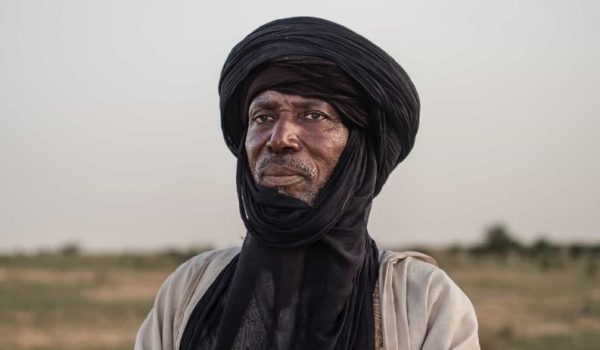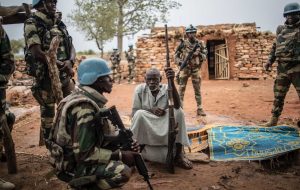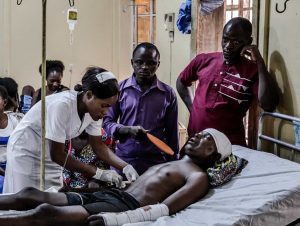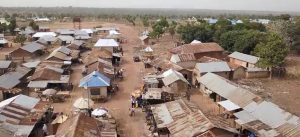Headlines
THE FULANI: One of the Last Nomadic People

COURTESY: AFP (FEATURES)
The Fulani number more than 35 million, spread across some 15 countries, from the Atlantic coastline of Senegal to the dense forests of central Africa. With their millions of heads of cattle, they follow centuries-old routes, speak a common language, and maintain their traditions in the face of mounting influence from extremist Islamic preachers and communal violence.
But the Sahel is being transformed at terrific speed into a vast area of no-go zones where access has grown ever-more difficult. Conflicts explode, peter out and rekindle themselves further down the road.
These historical trading routes have become among the most dangerous in the world.
In Mali, Burkina Faso and Nigeria, there are frequent clashes between herders and settled farmers over what remains the most treasured commodity: land. Whether searching for new pastures, or to protect their crops, all are in a desperate battle for survival.
The resulting spirals of violence are easily exploited by radical jihadist groups, and the Fulani find themselves stigmatised and held responsible for many of the region’s problems.
An AFP team spent months in 2019 following the Fulani on their journeys across Mali, Nigeria and Niger, seeing how they are adapting and fighting in order for their way of life to survive.
They are no longer fully masters of their destiny, facing the many great challenges of the century, from a demographic explosion and rapid urbanisation, to mass migration, climate change and Islamic extremism.
The following is a story of people often hidden behind the headlines of the Sahel’s wars.
JIHAD
Ibrahim hasn’t seen his wife in years. As far as she’s concerned, he is still “on adventure”, as west Africans call it when they head out on the migrant trail to Europe.
The reality is something far darker. Terrible memories that will never leave him.
Ibrahim remembers when the men first came to him years ago, while he was grazing his sheep near the family camp. Turbaned emissaries promising money and a chance to serve Allah.
He found himself in the ranks of a radical preacher named Amadou Koufa. His group, Katiba Macina, spread terror through the region in the name of Islam, as part of an Al Qaeda-aligned coalition called the Group to Support Islam and Muslims.
Koufa gave a local face to the international jihad, posing as the defender of the Fulani and offering a route out of grinding poverty.
His salary jumped twentyfold to 300,000 francs per month (some 450 euros)
With six hungry children in his charge, Ibrahim was easily convinced. “I was in such poverty, I could not refuse,” he recalls in a murmur.
His salary jumped twentyfold: 300,000 francs per month (some 450 euros), an incredible sum for a man from the bush.
But the fortune came at a price.
Ibrahim fled the group in 2016. In his mid-forties and unable to return home, he changed his name and dropped off the radar, in constant fear of being found by his former allies.
He cuts a lonely, tired figure today in Mopti, as a “push-push” steering his delivery cart around the city of 150,000 on the banks of the Niger river.
The “Venice of Mali” has suffered. In another time, tourists stopped here on their way to the majestic cliff villages of the Bandiagara and the region’s famed mud-brick mosques.
Today, the former tourist guides are unemployed and new arrivals are more often people who have fled burning villages, or former soldiers hoping to be forgotten. There is a fearful, fugitive look in many people’s eyes.
Multicolored pirogues — canoe-like boats — are still lined up along the riverfront, offering rides up to Timbuktu. But under no circumstances should you get onboard. “The jihadists attack the boats, assault travelers and loot their goods,” says one of the locals.
In Mopti, the jihadists are unseen, but never out of mind. They know everything that happens here, even if the sharp end of their violence is felt in the bush.
Not far beyond the city walls is where the worst of the atrocities take place. Three-quarters of the attacks in Mali happen in this central region. The UN counts more than 100,000 displaced.
All that changed in 2012 when Al Qaeda’s local surrogates stormed in, sweeping aside government forces, installing themselves in the north and setting themselves to the desecration of its historic treasures.
The people in the centre of the country braced themselves for the jihadist onslaught, armed with weapons that flooded in from Libya.
This was a region already struggling with endemic poverty, in which old animosities were growing more violent and desperate in the face of worsening droughts and skyrocketing population numbers.
In the chaos of the jihadist menace, the Fulani nomadic herders were particularly vulnerable to opportunistic attacks by members of the majority Tuareg community, who looted their villages and stole their cattle, says Boukary Sangare, a researcher with the Institute for Security Studies.
The government had its hands full in the north and was fearful of arming the Fulani directly, in case those arms were one day turned against them. “In the end, dozens of Fulani joined armed groups who offered protection,” says Sangare. Preachers like Amadou Koufa knew how to turn the Fulani’s marginalisation, fear and anger towards corrupt elites to their advantage.
When French forces arrived in northern Mali in early 2013, they were able to chase away the jihadists pushing south towards Mopti, but not the deep resentment that months of abandonment had seeded among the Fulani.
From there, a sort of peasant revolt unfolded. Fulani herders provided the backbone of Koufa’s emerging Katiba Macina, driven by a mixture of desperation, greed, faith and the desire to protect their families.
Ibrahim found himself in one of the “markaz” (encampments), surrounded not just by Fulani, but also members of the Songhai, Tuareg and Bambaras — all drawn to the magnetic preaching of Koufa, who took on the air, he says, of a “demi-god”.
“My comrades listened to his preaching all the time on their phones. They took everything he said literally,” Ibrahim recalls.
Koufa benefited from the spread of the internet in those years, with his speeches spread via WhatsApp into even the remotest parts of the bush. In a country fed on the oral tradition, this created a sort of alternative Sahel radio station, while in mosques and Quranic schools, Koufa harangued his Fulani “brothers” to defend the faith.
Ibrahim was one of those tasked with punishing the villages that resisted Koufa’s call.
His submachine gun never left his side: 36 bullets at a time for the enemy.
But that was no longer enough. One day, Ibrahim was called in by the head of his unit and told him bullets were too merciful. On that day, their throats must be slit.
Numbed by Tramadol and mysterious injections, Ibrahim lost himself in the carnage. But the images were seared in his memory. He killed at least twenty with his own hands, he says.
“For a long time, I didn’t understand the gravity of my actions. We were supposed to be putting people on the right path,” he says, his voice trembling. “That was the moment when I decided to flee.”
Ibrahim may have left, but plenty remain, and their work continues.
Today, outside of a few garrison-towns manned by the Malian army, the jihadists meet practically no resistance. They are known as the “masters of the bush”, free to sow terror wherever they wish.
Every week carries reports of peacekeepers and soldiers blown up by homemade explosives as they try in vain to exercise some control over this vast no-man’s land.
But the Malian soldiers are often part of the problem, lashing out at any Fulani they find, as the ancient nomadic community becomes ever-more associated with terrorism in the eyes of city-dwellers in places like Mopti and the capital Bamako — a familiar and vicious cycle of stigmatisation and violence.
“Even if there is a preponderance of Fulani among the fighters in the centre, the sedentary, urbanised Fulani have not followed the jihadists and have themselves been victims of assassinations, accused of collaborating with the authorities,” says Ibrahim Yahaya Ibrahim, of the International Crisis Group.
Life in the jihadist zone has the expected trappings of extremist Islam: fully veiled women, mid-length trousers for the men, a ban on music, smoking and alcohol.
But they are not entirely unpopular. Just as jihadists have done from Syria to Afghanistan to Indonesia, they provide a swift and clear form of justice — an efficient settling of local disputes that stands in stark contrast to the maddening corruption of the state bureaucracy. “That’s why people love them. A sense of justice is the priority for the poor,” says a former lawmaker from the region who has fled to the capital.
Some experts plead for an opening of dialogue with the warlords of the region. The jihadists are multiplying, while French and African forces are spread thinly over the enormous territory.
The jihadist threat has spilled into Burkina Faso and Niger, fed by the same ingredients: weak states, even weaker armies given to pillaging from locals, populations left to fend for themselves against militias and bandits.
The regional heavyweight Nigeria, Africa’s most populous country, could be next. The specific form of jihadism seen in central Mali has yet to emerge at the scale over the border, but the explosive mix of ethnic and religious tensions have been exploited by others in Nigeria already, and its fertile lands make for an alluring prize.
THE ATTACK
Monica may never experience those peaceful moments preparing breakfast ever again. Moments later, the attackers were in the village, moving systematically from house to house, massacring men, women, children, grandparents.
Within two hours, the village was strewn with the corpses of 27 people and another 16 severely wounded.
A week later, in the silence of the dispensary to which they were evacuated, Monica’s husband Dauda remembers: “My mother was killed on her doorstep. My wife tried to run, but they caught her.”
She lies on an old mattress on the floor, covered with a bright red loincloth, her face still frozen in shock. There are bullets lodged in both her legs. Her head is shaved and crossed by a huge scar. A coarse bandage covers her left wrist where they cut off her hand with a machete.
This “Middle Belt” of Nigeria used to be a place of happy co-mingling and trade, the meeting place between the country’s Muslim-majority north and Christian-majority south. The Fulani came once a year to trade milk for cereals, and fertiliser dung for cattle feed.
That annual ritual has gone. Falling rainfall and drought in the north has combined with the jihadist insurrection of Boko Haram around lake Chad to limit the options for Fulani herders, who have been increasingly forced to settle permanently in the Middle Belt.
What began as a competition over resources has quickly taken on a religious and ethnic flavour between mostly Christian farmers and Muslim herders.
Evangelist pastor Yohanna Buru is a rare voice calling for peace. In his big sunglasses, jeans and trainers, he strikes a relaxed pose, but his message is urgent.
“Do not seek vengeance. Pray for your enemies and the well-being of their souls,” he tells the congregation of a small church, many of whom have been displaced by the violence and are here to receive food packages.
Some look openly shocked at this message of tolerance, which jars with the frequent injunctions from political and community leaders to avenge the brutality they have suffered. A call for peace seems insufficient in the face of hunger, unemployment and fear.
“Fulani is not synonymous with terrorist,” Buru persists. In his home in the heart of the Christian quarter of Kaduna, a town where sharia law holds sway, he invites imams to celebrate Christmas and Easter by his side, and endlessly repeats his belief that “dialogue is the only option”.
He knows it is hard for the farmers to understand: “This land is their only wealth. All they know is how to cultivate it.”
Oyama Kwanaki is one of those who have lost everything. Lying on his hospital bed, nursing a bullet wound, this tough young man with anger in his eyes has plenty of time to mull over what happened. “What I saw that night, I can never forget. If I cross paths with a Fulani, he will pay.”
EXILE
In the eyes of many Nigerians, the Fulani are “invaders”, who value cattle more than human lives, and ignore laws as readily as they do borders.
Yet, for all the evils of which they are accused, the Fulani are just as often the victims. And as hatred and fear spread, even those who had settled and lived in harmony with Christian communities are increasingly being forced to flee and find refuge away from others.
In the forested savannah of the Kachia reserve in northwestern Nigeria, the Fulani have created their own refugee camp — an enclave of relative safety between huge stretches of scorched earth.
There were 18,000 displaced people here at last count, but the numbers are steadily rising, driven by massacres such as one in Kaduna in February 2019 that left 130 Fulani dead in a single night.
“There was nothing here when we arrived, just the bush,” says the camp’s only doctor, Idriss Jamo. “No one comes here out of choice.”
The only distractions beyond the five calls to prayer are the market and a football field, which comes alive every evening when the temperature finally drops below 40 degrees. There is no internet here, nor phone network. Not even electricity.
When Isa Ibrahim isn’t tending animals, he is a driver, ferrying people around on the back of Okadas — a cheap Chinese motorbike that is the only way of escaping boredom around here.
Isa was born a few dozen kilometres from here, when life was still built around the rhythms of the cattle.
As a child, he travelled alongside them for months at a time. He had time to enjoy the nomadic lifestyle of camps and bushfires. They are happy memories.
That tranquil life was shattered in 2011. The violence that followed Nigeria’s disputed elections split the region of Kaduna down ethnic and religious lines. Christians versus Muslims. Fulani against everyone.
Eighty members of Isa’s clan were killed one night. Of their 100 cattle, two-thirds were slaughtered. His polygamous family, with its 15 children, ended up as refugees on the reserve.
“Adapting was difficult,” he says. “We started farming because the cattle had greatly reduced.”
It wasn’t just the violence that changed things.
“It has become impossible to do 10 kilometres in the bush without cutting across someone’s fields,” says Isa. “The old migration routes don’t exist anymore. Everything is farmed.”
Cattle are no longer a symbol of wealth, but of survival.
As Nigeria’s population has exploded — it is on track to reach 400 million by 2050 according to the United Nations, up from 120 million at the turn of the century — so it has struggled to keep its people fed, with more and more land given over to fields of wheat, sorghum and cassava.
The Grazing Reserve Act promised, in 1964, to convert 10 percent of the land into pasture. It has never been applied.
“More than 90 percent of young people on the reserve are unemployed. They vegetate in the village. Some smoke weed or take codeine,” says local teacher, Shitu Abdullahi, 29.
Crime has become rampant. Cattle are stolen. Kidnappings are common.
“Many of those who lost everything ended up getting hold of weapons themselves. A Kalashnikov costs around 100 euros,” says Malam Mansur Isah Buhari, a teacher at nearby Sokoto University.
For many, the causes of this nightmare are maddeningly irrational.
Dr Ibrahim Abdullahi, who heads a herders’ union in Kaduna, says the idea of a Fulani jihad in modern Nigeria is “pure fantasy”.
But the stigma is hard to shake. Nigeria remains traumatised by the experience of the Sokoto caliphate in the 19th century, when slaves worked the plantations, salt mines and iron industries.
With every new episode of violence, the Nigerian press — whose main titles belong to southern magnates — invariably compares the herders to terrorists who wish to Islamise the country and return the country to those dark days.
The election of President Muhammadu Buhari in 2015, a Fulani Muslim from the north, did little to quiet these tensions. Buhari has been slow to condemn the massacres, and the security forces remain poorly equipped to protect communities, while the appointment of Fulani and other minorities to key government positions has only fuelled communal tensions.
“The majority of Fulani herders are poor, without access to education, and no one gives them a voice, even the elite in power,” says Dr Abdullahi. “It’s easy to put the blame on them for everything that goes wrong in this country.”
WATER
“We have waited for the first rains to fall in the north,” says Ali, his dark eyes piercing out from under his turban as he fills a gourd from a pump on the side of a road. “That’s where we are headed.”
Under the July sun, his caravan has crossed the border from Nigeria where Ali and his family spend several months a year, like many Fulani, to make the most of the humid air, the water and pastureland.
He still has a long way to go: more than 100 km to Bermo in the centre of Niger where thousands of Fulani herders head after their nomadic tours.
It is the toughest time of the year, as the long dry months and sweltering summer leave herders and animals alike running on empty.
In a country where four-fifths of the population live off the land and especially from livestock, climate change has deadly consequences. In Bermo, at the gates of the Sahel desert, the increasingly frequent droughts are decimating herds.
In 2018, the small town of 66,000 inhabitants tucked into the hollow of the dunes, awaited with growing anxiety the joyous first rains in May. But the month passed without a single drop.
Food prices skyrocketed and feeding the cattle became all but impossible.
In desperation, Rouada Sabgari saw no choice but to sell off some of his herd in order to eat. He received just 5,000 francs (7.60 euros) per head, against more than 200,000 (300 euros) usually. He has lost half his cattle in 10 years.
With every winter, the old herder asks himself how long his children can maintain this ancestral lifestyle.
Rouada is part of the Fulani Wodaabe clan, who travel vast distances from Niger through Cameroon and Chad to the Central African Republic.
They are also known as Mbororo after the variety of large-horned oxen that accompany them.
For him and the 25 members of his family, the cow is a symbol of freedom. It is also at the heart of their theology — the Fulani God created the world from a drop of milk.
“In other times, we didn’t eat cereals or meat. The milk was rich and abundant. It was enough to keep us strong. That’s not possible anymore,” says Rouada, sadly.
The great droughts of 1974 and 1984 decimated half the herds and marked a turning point in regional history. “The animals were so thin and tired that we had to hold them up. People were starving to death,” recalls Rouada.
The Fulani have prayed ceaselessly for a return of the old rains, but those prayers have not been granted.
The droughts have returned, and with them the food shortages, made worse by the violence and fighting along the borders with Mali and Nigeria.
Niger is the sixth-poorest nation in the world, but also has its highest birth rate, with an average of seven children per woman. Even in good years for rain like 2019, the population skirts along the edge of survival. Between June and August, in the driest months, 1.2 million people in the country find themselves with severe food shortages, according to the UN.
A local herder’s association, working with NGOs such as Oxfam, have put in place programmes to help those in most difficulty, hoping to restructure their lives without totally erasing their nomadic and pastoral lifestyles.
A dairy has opened in the centre of Bermo for the first time, supporting some 300 women who produce yoghurt and cheese to sell at the local market.
Hadiza Attahirou received two cows and now earns several thousand additional francs. “It’s a relief for my husband when he leaves for the nomad trail, and it pays for my daughter to go to school,” says the woman of 39, her mouth surrounded by traditional tattoos and arms covered in jewelry.
But life is not all hardship.
Azara, 18, has used micro-credit loans set up by the NGOs, to create ceremonial costumes in a mix of colourful weaves, pearls and encrusted shells for the great celebration of “Gerewol”. It marks the end of the rainy season — the most relaxing time of year for the local Fulani, when there is not a constant search for food, and both animals and humans can relax with relatively full bellies.
The nomad families arrive from all over the Sahel and set up their huge encampment. It’s an occasion to renew friendships — and love. There are marriages and new babies to celebrate. It’s also a time of high fashion: the men in long braids, elaborate make-up and amulets, preparing for nightfall when they will dance to seduce the women. Tradition dictates that, single or not, they are permitted, under cover of darkness, to choose a lover for the night, for a few days or even for life.
The men prepare for nightfall when they will dance to seduce.
The singing and dancing carries on late under the stars. It is only with the happy memories of Gerewol in their minds that the Fulani will find the courage to hit the road again, braving its many dangers and fierce heat. Because soon the grass will disappear and the ponds will dry up, and they will have to walk, ever further, in pursuit of the clouds.




